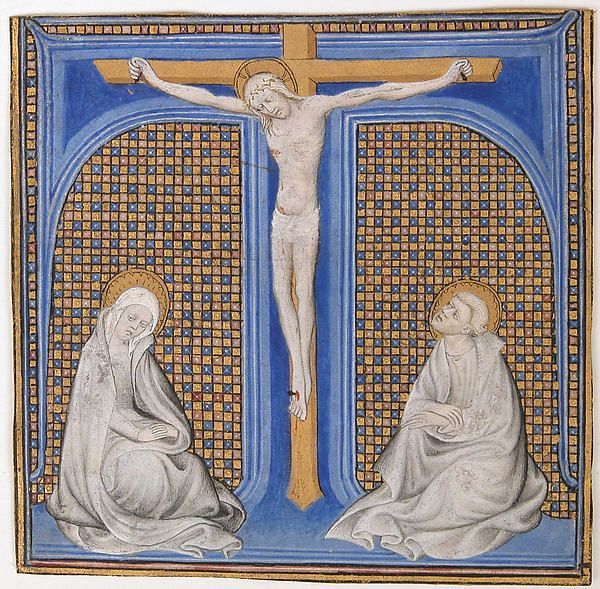Some Meditations have 2 options, you can choose any of them
Option A
Option B
Download.
Text
The Incarnation [101-109], [262]
[101]: This is a contemplation on the Incarnation. After the preparatory prayer and three preludes there are three points and a colloquy
Usual Preparation Prayer.
First Prelude. This will consist in calling to mind the history of the subject I have to contemplate. Here it will be how the Three Divine Persons look down upon the whole expanse or circuit of all the earth, filled with human beings. Since They see that all are going down to hell, They decree in Their eternity that the Second Person should become man to save the human race. So when the fullness of time had come, They send the Angel Gabriel to our Lady. Cf. # 262.
Second Prelude. This is a mental representation of the place. It will be here to see the great extent of the surface of the earth, inhabited by so many different peoples, and especially to see the house and room of our Lady in the city of Nazareth in the province of Galilee.
Third Prelude. The Petition: This is to ask for what I desire. Here it will be to ask for an intimate – meaning, profoundly felt and appreciated – knowledge of our Lord – meaning of His person, His divinity and His humanity, His interior and exterior –who has become man for me – meaning, that He went ahead of me, taking on the most difficult tasks, carrying the cross – that I may love Him more and follow Him more closely – by fighting against my carnal, sensual, and worldly loves and perfecting my actions by following His example.
For this contemplation on the Incarnation, Ignatius has us examine a sort of triptych, with the same three scenes three times each: in the first scene, we consider the earth, where the problems are, then the Three Divine Persons, who are “above the world” and who are the ones to come up with a solution because they love us, and then the scene of the Annunciation, back down to the world and wherein the solution is received. We’ll see the scenes, then hear the scenes, and then consider the actions of those involved. Obviously, each time, then, we’ll be seeing the scene, and adding more elements. It’s a sort of increasing intensity as we go back and see the scene again, adding more elements and details.
[106]: First Point: “This will be to see the different persons: First, those on the face of the earth, in such great diversity in dress and in manner of acting. Some are white, some black; some at peace, and some at war; some weeping, some laughing; some well, some sick; some coming into the world, and some dying; etc.
Secondly, I will see and consider the Three Divine Persons seated on the royal dais or throne of the Divine Majesty. They look down upon the whole surface of the earth, and behold all nations in great blindness, going down to death and descending into hell.
Thirdly, I will see our Lady and the angel saluting her.
I will reflect upon this to draw profit from what I see.”
Let us focus now on what is seen in this mediation. Consider the awful state that our world was in after the fall: there are so many people, all over the planet, all engaged in what we could call the “everyday drama of life”: some are at peace, some at war, some weeping, laughing, and the like. They are just going about their business, or so they think. They are just going about their business, but really this is the slow, silent path to hell. See how in their blindness they commit any number of sins, how they live in great forgetfulness of God, ignorant of the Trinity’s great love for them. They simply walk right into the yawning gates of Hell, which have opened up for them and are happy to receive them. “The safest road to hell,” wrote C. S. Lewis, “is the gradual one – the gentle slope, soft underfoot, without sudden turning, without milestones, without signposts.” “See their blindness, how they seek happiness only in this world, having forgotten God and surrendered themselves over to their passions; in this way their evil constantly increases, their awful deeds pile up, and then they die and fall into the endless pit of misery.”[1]
Notice the Trinity’s great mercy: what do They see when They look upon the earth? In Genesis (6:5-6) we read “When the LORD saw how great the wickedness of human beings was on earth, and how every desire that their heart conceived was always nothing but evil, the LORD regretted making human beings on the earth, and his heart was grieved.” Or, as Ps 53 reads (3-4): “God looks out from the heavens upon the children of Adam, to see if there is a discerning person who is seeking God. All have gone astray; each one is altogether perverse. There is not one who does what is good, not even one.” Imagine the pain and sorrow, as we read in the book of Job (15:15-16): “If the heavens are not without blame in his sight, how much less so is the abominable and corrupt: people who drink in iniquity like water!”
However, the Trinity looks down, not to punish, but to do good, to provide a remedy: They “behold all nations in great blindness, going down to death and descending into hell.” Rather than leave them to this fate, they send the Second person of the Trinity, the Son, to “save sinners” by going down among them, to live among them in that world of sorrow, to call them back to knowledge and love of God. “The Divine Persons focus their attention, not on the variety of circumstances or the horror of sins, but rather on the only thing that matters: the salvation of men, and to do it, not simply by an act of will, but in the most loving way possible. God would become man, even though it would cost Him dearly. For this, here He takes the first step, becoming like us in all things but sin, and is enclosed in the womb of the Virgin Mary.
See how Gabriel comes to announce the news: see how he comes to a lowly young woman, a poor woman, who, simple and modest, receives Him. See the lowliness of her house, her simply dwelling, her beauty. “The angel is diligent and faithful to his mission; Mary’s love is for purity and for prudence; she doesn’t ask unnecessary questions, and only later does she ask for the needed clarifications. She is humble, docile to God’s will, and she, in her humility, becomes the Mother of God.”
[107]: Second Point: “This will be to listen to what the persons on the face of the earth say, that is, how they speak to one another, swear and blaspheme, etc. I will also hear what the Divine Persons say, that is, ‘Let us work the redemption of the human race,’ etc. Then I will listen to what the angel and our Lady say. Finally, I will reflect upon all I hear to draw profit from their words.”
Let us now consider what is heard in that scene. Again, notice the contrast: how much hatred fills the world! Anger against each other, anger against the heavens, and anger and hatred against God Himself, who is the most loveable of all! How many lies are told, serious lies that cause scandal, lies that deprive the poor of what is theirs, lies that that shatter families, lies that lead to murder! Words of seduction, words of treason, gossip, false rumors meant to inspire fear, betrayals, whispers of temptations, murmurs against the Almighty and His servants . . . and we hear all of these words! Imagine all the sins of the tongue! In the book of Proverbs (18:21) we’re told that “Death and life are in the power of the tongue; those who choose one shall eat its fruit.” “Death and life are in the power of the tongue; those who choose one shall eat its fruit.” Men had chosen death, and had eaten the fruit of eternal death. What power words have! These men do not realize what they are doing; in their words, they only think of obtained what they desire for this life, what their passions clamor for: lies, blasphemies, gossip . . . all for pleasure or advantage in this world. That’s all.
And yet, God has His words as well. He has “the words of eternal life.” Hear the conversation between the Trinity: “Let us work the redemption of the human race.” “Let us work the redemption of the human race!” It’s as though they don’t hear those horrible blasphemies, as though they ignore man’s horrible crimes, as though they have covered their ears when faced with those sad diatribes! What mercy! Again, their sole concern is to save man, even in spite of his evil deeds.
Imagine their words: as the prophet Jeremiah recalls (29:11): “For I know well the plans I have in mind for you, plans for your welfare and not for woe, so as to give you a future of hope.” Imagine them speaking amongst themselves, all the while concerned for man, although they are perfectly happy in heaven! What compassion! Consider the words of Isaiah (6:8): “I heard the voice of the Lord saying, “Whom shall I send? Who will go for us?” Then Christ speaks: “Here I am,” I said; “send me!” “As is written of me in the scroll, ‘Behold, I come to do your will, O God’ (Heb 10:9).
In the midst of all the death-dealing words of men, the Word of God comes to earth to save men. As Saint Athanasius writes, Christ is “the word of the good God, who is God in His own right. The Word is different from all created things: He is the unique Word belonging only to the good Father. This is the Word that created this whole world and enlightens it by His loving wisdom.”
What power words have! The angel Gabriel comes to Mary, and speaking His words of greeting, asks her to conceive the Word of God, the remedy from heaven. As Saint Bernard of Clairvaux urges our Lady, “Answer with a word, receive the Word of God. Speak your own word, conceive the divine Word. Breathe a passing word, embrace the eternal Word.” Mary, full of charity and freedom, responds, “Fiat. Be it done unto me according to your word.”
What power words have! Words can bring condemnation, but now the Word comes to bring life and salvation!
[108]: Third Point: “This will be to consider what the persons on the face of the earth do, for example, wound, kill, and go down to hell. Also what the Divine Persons do, namely, work the most holy Incarnation, etc. Likewise, what the Angel and our Lady do; how the Angel carries out his office of ambassador; and how our Lady humbles herself, and offers thanks to the Divine Majesty.
Then I shall reflect upon all to draw some fruit from each of these details.” So now we have the vision of the greatest intensity: not only do we see the scene, not only do we hear it, but now we’re contemplating the actions of those here.
Let us consider the actions of those in this scene. Consider the violence of those on the face of the earth, how, having forgotten God, men and women give into violence. They wound and kill, in so many different ways: they wound and kill the body, of course, but they also wound and kill minds by filling them with lies and hatred, blinding them to truth and goodness. They wound and kill spirits, enslaving them to sin and its seductions. Worst of all, they wound and kill souls, binding them under the burden of mortal sin so they end up in hell. See more clearly now the evils deeds that they do, and how they are dragged down into hell. Again, all these actions for a temporal benefit, but they are ignorant of their last end, what they should really be doing!
What does the Trinity do? Upon seeing the sad state of man, rather than punish, they also begin to act, but to save men and women from their fate. See how the Son, although perfectly happy in heaven and with no need of anything, agrees to become incarnate on the earth, to take a human nature, in order to show men and women the way back to God. Men and women have killed minds with lies and hatred, but Christ will fill them with the light of truth and charity. They have wounded and killed spirits, but Christ will break the bonds of sin and death. They have bound souls under mortal sin, but Christ will free them.
See how Christ comes, not as a king, not born of an earthly queen, but of a lowly maiden! The guilty will not be won back by blows or punishments, but by charity and patience. Christ assumes His human nature, not in a palace, not on a throne, but in poverty and humility.
See how His Mother humbly receives the angelic messenger. In the midst of her daily tasks, her humble work as a lowly maiden, the angel fulfills her task and Mary, full of charity and freedom, responds, “Fiat. Be it done until me according to your word.”
[109] Colloquy: The exercise should be closed with a colloquy. I will think over what I ought to say to the Three Divine Persons, or to the eternal Word incarnate, or to His Mother, our Lady. According to the light that I have received, I will beg for grace to follow and imitate more closely our Lord, who has just become man for me.
Close with an Our Father.
[1] Cf. Calveras, Practica intensiva, 220.

Take, Lord,
and receive all my liberty, my memory, my understanding, and my entire will, all that I have and possess. Thou hast given all to me. To Thee, O Lord, I return it. All is Thine, dispose of it wholly according to Thy will. Give me Thy love and Thy grace, for this is sufficient for me.
(Spiritual Exercises #234. Louis Puhl SJ, Translation.)



